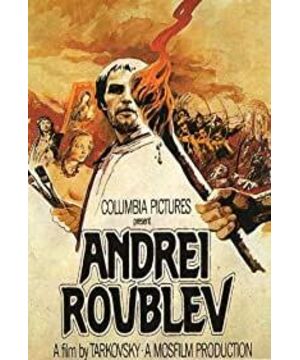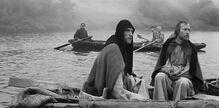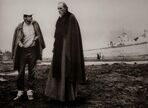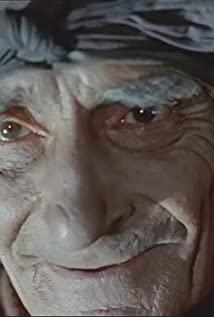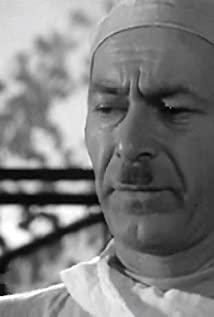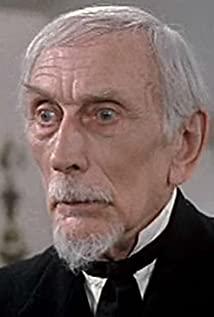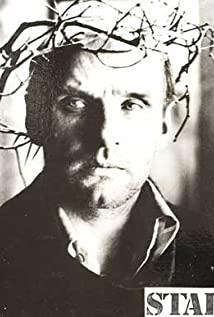The film of the old tower may really have something divine, and it will inadvertently comfort people, making me feel that it is necessary to express my respect for the tower. This film in the tower should be considered quite difficult. Because of the lack of understanding of religious views and historical background, plus the inhuman subtitles, it is really seen in the clouds and mists. This time it’s correct to watch it again. The movie basically has a general impression. I dare not ask for a deep understanding, but the melancholy temperament and the sense of destiny flowing from the image have a certain reflection on my state of mind, giving people a kind of dream-like reality, in order to fight against the deep inside. emptiness.
In the prologue "Efim, I'm flying!", the hot air balloon rose slowly with the meaning of Jesus ascending to heaven. With the babbling and shouting, everything underneath began to become insignificant, and the misery on the vast land also disappeared. However, what followed was the balloon stalling and falling, with a crash, leaving only the horse tossing its body. The victim's attempt to seek relief was finally swallowed silently in the tranquil scene, a metaphor for a greater sadness falling from the sky, and the film opens.
1. Wandering entertainers: In 1400, three monks were walking on the vast Russian grasslands. When it rained heavily, the three people hiding in the house to take shelter from the rain witnessed a wandering entertainer's performance. "God creates priests, and the devil creates wandering entertainers." This is Kirill's evaluation. In the ignorant and abstinent Middle Ages, such madness is undoubtedly a blasphemy against God. A few officers took away the wandering entertainers shortly afterwards. Someone informed them. It is not difficult to guess what happened from Rublev's inquiry about Kirill's whereabouts. In the face of the wandering artist’s misfortune, Rublev may have made waves in his heart, but at this moment he is just an outsider. Out of a certain loyalty to the faith, he chose to regard it as a "necessary evil." The rain stopped, and the three monks continued on the road. On the other side of the river was an army of wandering artists carrying wandering artists, brightening and darkening, drifting away.
2. Feopan Grek: In 1405, through the city of Moscow, which was full of tortures and victims, Kirill came to the cathedral alone to look for the most famous icon painter Feipan Grek at the time. At this time Rublev’s painting talents have spread far and wide, and even Feopan admires his talent. However, Kirill’s comment on this is "What he lacks is fear, faith, and faith from the depths of his soul!" "These remarks aroused Feipan's interest. He comforted Kirill to help him draw the icon. Kirill's condition was that Feipan had to go to the monastery and invite himself to be his assistant. This scene is actually a projection of Kirill’s deep desires and beliefs, that is, to terrorize his people in the name of Jehovah and redeem sins with blood. This is completely different from Rublev's method of inspiring the people with fraternity. , And the root of this difference is that Kirill does not have the artistic talent of Lublev, the kind of talent that comes from God, which makes him doubt the justice of the Lord, so he needs to use a kind of almost paranoid The attitude of serving God to support his faith. "How long will you have to torture this poor villain, terrible sinner, do you still plan to achieve justice?" The words Feopan shouted to the executioner in the city seemed to be a footnote to Kirill. Feopan sent someone to the monastery shortly afterwards, but the invitee was Rublev. Poor Kirill witnessed Rublev accepting the invitation. At that moment, his faith completely collapsed. "Void void, Ecclesiastes says, everything that doesn't care is void." The endless sense of disillusionment drove Kirill to leave the monastery. He yelled and said the sordidness under the monastery's sacred exterior. In the end Kirill was expelled from the church. Wandering world. In my understanding, Kirill’s body is quite a shadow of Cain, full of lies, hypocrisy, jealousy and disrespect to God, but this is not entirely his sin, he bears the original sin of the entire mankind, a certain meaning Above, this is also a question of whether God is really omnipotent and omnipotent. On the other side, Rublev invited Danila to accompany him to Moscow. As the leader and only friend of Rublev’s paintings, Danila unexpectedly rejected him. Rublev, who had been isolated from the world for decades in the monastery, suddenly experienced brothers' wall and changes in people's hearts, which shocked him greatly. Since then, Rublev began his road of salvation.
3. Andrei's Passions: In 1406, this scene was a debate between Feopan and Rublev on religious values. In fact, it was also an ultimate proposition put forward by the director under the guise of the two. "The Doomsday Judgment is coming. We will burn like candles. Everyone will shirk each other's faults and excuse themselves before the Lord." Feopan knows that selfishness and betrayal are the original sins of mankind, and ignorance is here. The land is staged again and again. "Assuming that Jesus returns to this world, we will certainly crucify him again." Feopan's view of the world is absolutely pessimistic. He chose to serve God instead of mankind. In contrast, Rublev dared to defend mankind. The death of Jesus was because the Pharisees took advantage of the people's ignorance, and the people need to be constantly reminded to avoid ignorance. It is not difficult to see that Feopan’s religious view is based on experience. He has witnessed the repeated sufferings of mankind countless times, but he could not find the way to salvation. He had no choice but to abandon mankind. Rublev’s view was full of idealism. It is based on that God is omnipotent and omnipotent, and the sins of mankind can be redeemed through repentance. These are two distinct religious views (may be understood as the divinity of God and the humanity of Jesus), but they are also intertwined in a sense (the scene when the two meet again in the sixth section of the film is the scene when the church meets again) Intertextuality of these two religious views). At the end of this scene, there is a surrealistic picture, that is, the scene of the crucifixion of Jesus appears. "Misery fell on us Russians like rain. The Tatars invaded three times a year, famines and plagues, but he continued to toil, still carrying his cross humbly, he did not despair, but silently endured everything. And get the strength to continue to support in the prayer to God, until so, don’t you believe that God can’t forgive their folly? Jesus, maybe his birth and crucifixion were just to reconcile people with God.” So far , Combined with the title of the scene, the meaning of saints in Andrey is already very obvious, and how did Fiopan respond to this monologue and interrogation of Rublev? ——"I'm just a free man who is still vulgar." What a meaningful sentence...
4. Festivals: In 1406, a sly and seductive sacrificial voice came, attracting Rublev like a certain magic, and he strayed into a pagan carnival. Naked boys and girls were running on the grass. They kissed passionately and made love wantonly, but Rublev, who was an uninvited guest, was spotted and he was tied to a cross. After the people left, a young girl came in. Rublev regarded this kind of fornication as a great sin, but the girl said, "At this time tonight, everyone must love each other. Is love also a sin?" According to Rublev’s belief, this is not love, but a soulless act like a beast. "What's the difference, love is the same", so the girl kissed Andre. Finally, the girl let go of Andre. Here the girl is more like the person who introduced Rublev into the secular world (can even be understood as having a certain feeling of Jesus incarnation?), she made Andrey understand the suffering and complexity of the human world. In the early morning of the next day, Rublev, who was full of scars, returned to his companion on the riverside. Facing the question of the apprentice, he lied, claiming that he had lost his way in the forest last night. Rublev, who violated the two precepts overnight, developed a strong self-doubt. At the same time, behind him were Orthodox Christians rounding up infidels, and it was not someone else who was being chased. It was the girl from last night. Andrei ordered an adult. Blocking the eyes of the pupils to prevent them from seeing, how unbearable this situation is? How hypocritical? Last night, the girl rescued Rublev, but Rublev, whose mission is to redeem the people, can do nothing or do anything. His faith is suffering a huge impact. Is this the way he believes in salvation? ? In the end, at the expense of the girl's husband being arrested, the girl jumped into the river and swam from the side of Rublev's boat, and the girl on the boat only closed his eyes and repented. Under the lens of the old tower, everything speaks for itself.
V. The Last Judgment: In 1408, Rublev and Danila and his party were ordered to paint a fresco for the cathedral in Vladimir. However, two months later, the walls were still white. "I can't paint this. It disgusts me. I don't want to scare the people, Danila." Rublev's artistic instinct prevented him from picking up a paintbrush to paint the sinner who was punished in the asphalt, to paint the nose with green spray. The devil of smoke, he cannot accept that religion is reduced to a tool for rulers to terrorize the people. Under pressure, the apprentice Fuma chose to leave Rublev to find another way out. At this time, a biblical recitation sounded, "If I speak the language of humans and angels, but don’t have the slightest love, I’m just a jingle. Copper piece, if I have the ability to foresee the future...Love is patient and kind, love is not jealous, love is not boastful, love is not arrogant...Love never ceases." (New Testament, Corinthians) 13-4) Corresponding to this is the picture of Rublev playing with the duke’s daughter. Under the reflection of the princess’s innocent smile, Rublev finally learned the true meaning of art, that is love. However, do people still have the opportunity to perceive this pure love like a child? The answer is obviously not a positive sentence. In order to demonstrate the glory of the Grand Duke, the architects and sculptures in the church completed their work day and night. With the arrival of the Duke, they proposed to go to the Duke’s brother to work, and this already went against the Duke’s wishes-just out of fear of the younger brother. His glory surpassed himself—then the final destiny of the craftsmen was to be blinded by a team sent by the Grand Duke. Perceiving all of this, Andre angrily splashed the oil paint on the wall, like blood. Does the final judgment mean that the rulers abuse innocent people? Then there was the second bible read by the little student Sergey," Christ is the head of a man, the husband is the head of the wife, and God is the head of Christ... If a woman does not cover her head in prayer, she humiliates her head... Because men are not from women, but women are from men . "(1 Corinthians 11-2) "You heard, Danila, why is she a sinner?" Just because she didn't wear a turban? Do you call this a sinner? ! "Finally, Rublev had doubts about the sin described in the Bible. Is God really just? Will people who live like ants really get salvation from God? Rublev can't answer all this, only Rushing into the heavy rain. At the end of this scene, a mad and mute woman came to the church and wept bitterly in the face of the ink stains on the wall, witnessing Lublev’s pain and rushing into the rain. The mad girl is a symbol of holy folly, ever since She will accompany Lublev, she will uphold the will of God, enlighten and redeem him with madness, in a sense, in fact, Lublev will eventually embark on the path of holy folly. (The old tower’s movie symbolizes holy folly. The image of is quite common, such as Dominic in "Homesickness", the postman in "Sacrifice", and even the protagonist in "The Lurker" has the meaning of sacred and foolishness.)
Invasion: In 1408, in order to fight for the throne, the archduke's brother colluded with the Tatars, and the army invaded the empty city of Vladimir. Foreign people invaded, compatriots smashed each other, men were murdered, women were raped, and the whole city fell into flames. Everyone in the cathedral bowed and prayed, but the sound of religious chanting could not reach the iron hoof of the Tartars. As the door of the church was knocked open, just as described in the "Revelation", the disaster of the end was unfolding in the sacred church. (This paragraph is also interspersed with the Duke’s brother’s memories of being baptized with his elder brother in the church before. The language of the tower is too rich, so I won’t repeat it.) The holy fool was taken away by a soldier. In order to protect her, after all, Lublio The husband still raised the axe in his hand. At the moment when he committed this unforgivable crime, Rublev's faith finally collapsed. Along the way, he witnessed love, deception, and death countless times, but he had never seen God once. Just like the tatar leader's unintentional mockery of the Virgin Mary on the fresco—"If he has a son, what kind of a virgin is he?" To Rublev, what is the meaning of all this? The smoke cleared, and only Lublev and the holy fools were left in the church of Novosibirsk. A black cat ran past, the bell rang, and Feopan appeared again in the illusion and dream. "Fiopan, aren't you dead?...Killing, robbery, you have told me all this, but now, I am more painful than you, you are dead, and I... I have been alive for so many years In blindness, for them, I spent day and night, for these people, but they are not people, you were telling the truth.” After experiencing a huge disillusionment, Rublev at this moment seemed to understand what Feopan said at the time. However, what did Feopan say about this—"I was wrong at the time, and you were wrong today." In this scene, when the two met again, their respective opinions seemed to be reversed, and Rublev became desperate. Feopin became tolerant. As a result, these two religious views can once again complement and dissolve each other. It can be said that the two arguments are connected in a certain way. Under the contrast between the two people, a logical closed loop is formed, that is, after suffering and going through After the vicissitudes of life, these two views reached unity and sublimation in the opposition. Rublev confessed that his sins were so serious that he was unforgivable, and he decided not to paint anymore, while Feopin used a passage of the Bible to persuade him to regain his faith-"Although your sins are like scarlet, they will become as white as snow. Dan Yan will be as white as wool... (Isaiah 1-17)" In order to redeem his sins, to redeem himself and the countless Russian people and even the land under his feet, Rublev vowed not to speak any more. He asked Feipan’s opinion on this. What did Feipan say-"God (Heaven), It’s not what you imagined there.” So, in this scene, Feopan guides Rublev from the perspective of God as a forerunner, but he doesn’t make it clear that his appearance is divine and self-conscious. Top down. After all, Rublev had to understand all of this by himself. "There is nothing more terrible than snowing in the temple, right?" Snowflakes floated in the church, the Holy Spirit disappeared, and everything returned to peace.
7. Silence: In 1412 Rublev returned to the former Three Holy Monastery life with the mad and dumb woman. "Since that incident, he has stopped talking. He is making atonement for himself, and he also brought a naive mute woman, so that neither of them need to talk." Rublev has been silent for four years, and at that time The land of Russia is suffering from year-on-year famines. The land is hungry and the people are struggling to survive. A tramp in ragged clothes came to the monastery. It was Kirill. This poor man could no longer bear the sins of God. Kirill asked the bishop to forgive him and take him in. Humble confession, who can never sin in this era? The Tatars rushed into the monastery. They threw down the pieces of meat. The dogs rushed to fight for food. The mad woman picked up the pieces of meat and put them in her mouth. The Tatars put on her a deer helmet and cloak. They laughed together. . The Tatar held the mad woman on her horse with one hand, and the mad woman ignored Rublev's obstruction and followed the Tatar. The Holy Fool will appear at the right time, and will inevitably leave at the right time. Rublev thought that he had saved the mad girl, but perhaps the mad girl saved Rublev. "Andre, you didn't recognize me? Don't be sad, maybe they only took her for a lap and then let her back." Kirill said, but Rublev just kept silent, only silent , Eternal silence.
Bell Casting: In 1423, a team of people came to the foundry's house to find someone who would cast the bells for the Grand Duke. However, under the raging plague, the village had long been changed beyond recognition, and only the young Pollyska, the son of the clockmaker, was left. Hearing that the Grand Duke was looking for a bell-making man, Polliska yelled: "Take me to the Duke. I can make the most beautiful bell. I understand the mystery of the bell. My father told me before his death. He told me... "So Pollyska took over the task of making the clock. He shoveled out the pit for making the clock. He found the best clay in the heavy rain. He had to direct his fathers to work for him, and all of this , Lublev, who had never known him before, was watching silently. Next to the huge casting pit, Rublev was very old. He looked at the exhausted Pollyska in the pit without saying a word. Suddenly, his thoughts returned to the day of heavy rain. The three monks walked on the grassland, under the familiar birch tree, leaning on Kirill and Rublev, but Danila was no longer there. Unsure whether it was a dream or reality, the workers carried the sleeping Polska and walked past the birch trees. It was like a kind of fateful reincarnation, as if it heralded that the world had returned to the way it was when it first started, Rublev, something is going to happen. The casting bell has entered the final stage and is ready to start ignition. The crowd watched by the fire. Suddenly someone rushed towards Lublev, who turned out to be a wandering artist who was arrested many years ago. He thought that it was Lublev who informed the secret, and this put him in jail for ten years. Kirill fell on his knees between the two, and amidst the laughter of the crowd, the wandering artist left in anguish. Andre, Kirill, and wandering entertainers, this scene seems to have known each other, more than ten years have passed, but all this is still the original appearance, and the people suffering like wandering entertainers are still living in the huge absurdity. Finally, Kirill faced Rublev and he confessed, "I keep thinking about this, and I want to tell you now, you know very well that I was jealous of you, until one day I heard that you no longer paint... No matter what, listen to me, go to the Three Holy Church to paint, go paint! Paint! Look at this useless thing in front of you, why do you think I'm back again? I'm dying, so are you, you are going to bring your talents Go to the grave... Say something, Andrei! Curse me, stop being silent!" Lublev bore Kirill on his body, and he used silence to atone for Kirill, and also for himself Atonement, in the face of Kirill's confession, Rublev still chose to remain silent. The big bell has been cast, and it's time for the bell to ring. Grand Duke, envoy, all the people of Vladimir City are here. The men tensed the ropes, turned the pots, and the archbishop recited the Bible and poured holy water. Finally, the bell hammer was pulled, and the air buzzed with the swing of the bell hammer. In the next second, a solemn bell sounded, resounding throughout the world. At this moment, everyone laughed, as if all the suffering was washed and washed away by the bell, and our holy and foolish mad girl also came, dressed in white, holding a steed, smiling in the solemn bell. , Like an angel. The camera zoomed up, and we saw Pollyska walking out of the crowd alone. Amidst the laughter of the people, we heard the little Pollyska crying bitterly, and it was Rublev who carried the child into his arms at that time. "You know, my father never told me any secrets, this old bastard, he didn't tell me anything." Facing the confession of the child before him, Rublev seemed to finally understand who he should be— -He has nothing but dares to pursue everything. He is proud, bold, and full of passion. He only does things with his inner beliefs. He is so innocent. This kind of simplicity transcends the complexity of human nature and possesses a certain divinity. At this moment, Rublev witnessed the miracle. He saw God from the fluttering bells, saw God from the people's laughter, and saw God from the boy in front of him. At this moment, Rublev completed his self-salvation, and his belief was answered by God, so he finally put aside his silence and said to the boy, "You and I, from now on, let’s go on together. You make a big bell, I Painting an icon.” After suffering, Rublev may finally realize that faith does not need to be verified, only to believe. The camera zoomed up, and we saw Pollyska walking out of the crowd alone. Amidst the laughter of the people, we heard the little Pollyska crying bitterly, and it was Rublev who carried the child into his arms at that time. "You know, my father never told me any secrets, this old bastard, he didn't tell me anything." Facing the confession of the child before him, Rublev seemed to finally understand who he should be— -He has nothing but dares to pursue everything. He is proud, bold, and full of passion. He only does things with his inner beliefs. He is so innocent. This kind of simplicity transcends the complexity of human nature and possesses a certain divinity. At this moment, Rublev witnessed the miracle. He saw God from the fluttering bells, saw God from the people's laughter, and saw God from the boy in front of him. At this moment, Rublev completed his self-salvation, and his belief was answered by God, so he finally put aside his silence and said to the boy, "You and I, from now on, let’s go on together. You make a big bell, I Painting an icon.” After suffering, Rublev may finally realize that faith does not need to be verified, only to believe. The camera zoomed up, and we saw Pollyska walking out of the crowd alone. Amidst the laughter of the people, we heard the little Pollyska crying bitterly, and it was Rublev who carried the child into his arms at that time. "You know, my father never told me any secrets, this old bastard, he didn't tell me anything." Facing the confession of the child before him, Rublev seemed to finally understand who he should be— -He has nothing but dares to pursue everything. He is proud, bold, and full of passion. He only does things with his inner beliefs. He is so innocent. This kind of simplicity transcends the complexity of human nature and possesses a certain divinity. At this moment, Rublev witnessed the miracle. He saw God from the fluttering bells, saw God from the people's laughter, and saw God from the boy in front of him. At this moment, Rublev completed his self-salvation, and his belief was answered by God, so he finally put aside his silence and said to the boy, "You and I, from now on, let’s go on together. You make a big bell, I Painting an icon.” After suffering, Rublev may finally realize that faith does not need to be verified, only to believe.
The ending film changed from black and white to color, and Rublev’s masterpiece "The Trinity" appeared in the mural. Under the drizzle, horses are grazing leisurely by the lake, which symbolizes the reincarnation and rebirth of life. The movie ends.
Due to my limited ability, I can only use this way of retelling movies to record, which is of little significance. Movies are the art of images, especially for Tasmanian movies. Any description in words is undoubtedly a destruction of image language. A good movie gives people thinking rather than giving answers. Everyone probably has a different experience when watching it. This "Andrei Rublev" was made by Tarkovsky at the age of 34. Compared with the latter Two films with sci-fi colors and two more alienated works after he was far away from his homeland, I think this film can more evenly summarize the artistic pursuits and beliefs in life of the tower. Why not Lublev’s life? Staged on the old tower. "Andrei Rublev" involves many aspects such as religion, art, history, ethnicity, and the country. Every angle has great enlightening significance. Since I don’t understand the Orthodox Church and Russian history, I can only choose one angle. Some images are relatively simple and intuitive to understand, for reference only. I wrote such a long paragraph, mainly for memorial purposes, but I am actually grateful that I started to see some masters' works by coincidence. In a sense, they gave me another way to see the world. Finally, my favorite scene in this movie is the scene of casting a bell. I hope that we can all have the courage to face life, just like Pollyska.
View more about Andrei Rublev reviews


